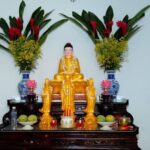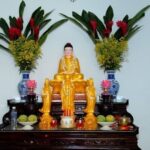The Significance of “Big Mouth, Small Mouth” in Ancient Architectural Feng Shui
The Chinese proverb, “big mouth, small mouth,” refers to the main entrance (“big mouth”) and windows (“small mouth”) of a traditional courtyard house. This saying stems from ancient feng shui beliefs, particularly in the architecture of the quadrangular compound, commonly found in ancient times.
According to feng shui principles, the East direction is considered auspicious, bringing luck and prosperity. Therefore, the main house is typically built facing this direction.
However, if the main door (big mouth) of the house facing east is in a straight line with the windows (small mouth) of the house facing west, it is considered a major taboo. This belief stems from the idea that such an alignment will lead to a “broken home,” bringing misfortune and decline to the family.

The “big mouth, small mouth” proverb refers to the main entrance and windows of a house in the context of ancient feng shui beliefs.
The rationale behind this belief lies in the feng shui theory of “qi” (energy): “Qi, when meeting wind, disperses; when encountering water, stops.” Ancients believed that if the main door and windows are directly opposite each other, the beneficial “qi” will quickly escape without being able to gather inside the house.
This belief has a direct impact on the family’s fortune, health, and prosperity. Moreover, in traditional symbolism, having the main door facing the windows represents financial loss, further solidifying this taboo across generations.
Analyzing the Proverb from a Modern Perspective
From a modern scientific standpoint, the concept of “qi” in feng shui is often deemed superstitious. However, when examined from an aesthetic and architectural perspective, the proverb still holds reasonable value.
Aesthetic Balance: In the quadrangular compound architecture, symmetrically placing the main door and windows creates a harmonious and grand appearance for the house. Conversely, if the windows are too large or disproportionate to the main door (“big mouth, small mouth” imbalance), the overall structure may appear unbalanced and disharmonious, impacting not only aesthetics but also the sense of order and stability within the living space.
Wind Tunnel Effect: Another interpretation relates to the wind tunnel effect. When the main door and windows are on the same axis or directly opposite each other, especially in the south direction, the house can benefit from ample lighting and ventilation. However, this setup can also lead to strong wind tunnels. Wind tunnels can damage furniture and create discomfort, affecting the health and well-being of the elderly, children, and individuals with fragile health.

Modern scientific perspective often deems the concept of “qi” in feng shui as superstitious.
In ancient architectural manuals, this wind effect was referred to as “poisonous wind,” something to be avoided. While ancients attributed this to the dispersal of “qi” by the wind, it is, in fact, a sensible warning about the detrimental effects of wind tunnels on family health and well-being.
The proverb, “Big mouth against small mouth, the family will perish, and the house will crumble,” though steeped in spiritual beliefs, is not without basis. It showcases the ancients’ attention to factors influencing their daily lives, such as architectural balance and minimizing wind-related hazards.
While modern science may dismiss much of the feng shui explanations, delving deeper into these proverbs helps us understand the traditional culture and valuable life experiences of our ancestors.



































